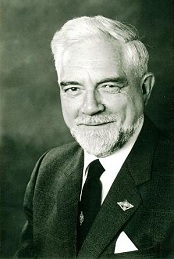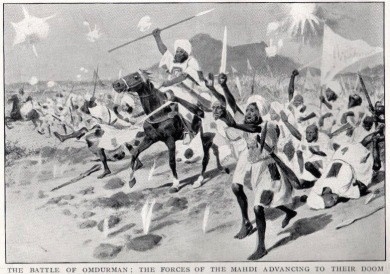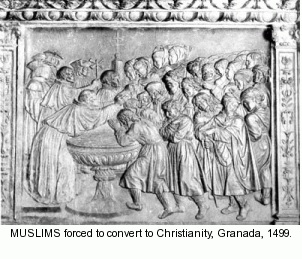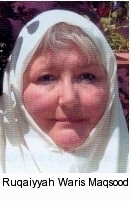At daggers drawn with 'demonized flesh' (2)

John Laffin
Murray Dixon and the specter of Christian Zionism
PART TWO -Semantics in the service of polemics
As New Zealand entered the 1980s, the country was more concerned about apartheid in South Africa than about Islam. Islam was sometimes in the news, but was not a big issue. All that changed in 1986, when local Christian Zionists declared war on their perceived enemy in the interminable struggle against "demonized flesh" and the "father of lies".
I realized that something was afoot on July 13, when a letter from a "Dr John Laffin", of Monomark House, London [4], appeared in the letters columns of the Tribune — a free, weekly, Palmerston North newspaper that doesn't normally find its way to Wellington, let alone London. The letter began: "As a recognized world authority on Islam I cannot allow to go unchallenged and uncorrected some comments made by Dr Ashraf Choudhary [5] in your issue of June 23." (This issue had carried an article by Jim Marr about the contributions that Muslims could make to New Zealand society.) The letter went on to make such sweeping statements as "Islam is a religion of pride while Christianity is a religion of humility". Laffin then took Choudhary to task for saying that "Islam" means "peace", and claimed that "No authority on Islam, whether Muslim or not, construes or translates 'Islam' to mean 'peace' ".
Puzzled by this alacritous outbust from an "authority" in London, I went to see the editor of the Tribune. But she only added to the mystery: The letter had been posted in Palmerston North, not London. "Yes," we thought it was a little strange," she said, "so we kept the envelope." She produced it for me. And there, in the top left-hand corner, were the words "International Christian Embassy (Jerusalem)". There was also a Palmerston North telephone number, which I called.
The telephone was answered by Murray Dixon, to whom I introduced myself as a person who was "interested in religion". Could he tell me what "International Christian Embassy" was all about? He certainly could. He spent about 10 minutes explaining the principles of Christian Zionism, although he did not, of course, use that term. I thanked him, and hung up.
I also wrote a letter to the Tribune, in which I pointed out that there are, indeed, authorities who say that "Islam" means "peace". I quoted Huston Smith, a former professor of religion and philosophy at Syracuse University, New York, as saying: "Islam is derived from the word salam, which means primarily 'peace' but in a secondary sense 'surrender'. . ." To be more precise: both iSLaM and SaLaM, as well as such words as muSLiM, SaLaMa (safety) and ur-SaLeM (Jerusalem), are derived from the three-consonant Semitic root S-L-M, whose generic meaning includes the concepts of peace and submission. But Christian Zionists evidently regard etymology as a science of the Evil One, for they are never fazed by truly authoritative statements. In his undated article A Kiwi in Israel, which can be found on the internet, Dixon continues to maintain that "Islam does not mean 'peace' as some suggest, it means 'submission' — submission to Allah". The purpose of this restrictive definition is not hard to detect. In English, "submission" and "surrender" are loaded words that suggest mindless subservience and "Oriental fatalism" — traits that fit the image of the Muslim that Dixon would like to cement in our minds. And peace, of course, is something that cannot be associated with those "commanded to kill anyone who chooses not to convert to Islam". (Islam and Terrorism, 2002, Charisma House, by Mark A Gabriel, Page 87.) Semantics is thus an indispensable ally in the assault on Islam, as is the framework of a discourse that confidently posits Islam as a defendant in the court of public (Western) opinion. The discourse is not without irony, however. Also on Page 87 of Islam and Terrorism, we find ". . . every Muslim's duty is to actively fight the enemy, overturning the system of the non-Muslim country and establishing Islamic authority", which sounds remarkably like what George W Bush is trying to do in reverse in the "Middle East" (a Eurocentric term) with his constant calls for "regime change".
No Laffin matter: the racist tour of 1986
The skirmish in the Tribune's correspondence columns — which briefly saw this obscure local newspaper elevated to international status — turned out to be the start of a furor that would last for the remainder of the year. For International Christian Embassy / Prayer for Israel announced that Laffin would undertake a three-week lecture tour of New Zealand in September of 1986. This tour, financed by the "embassy", ran into controversy almost immediately, when Federation of Islamic Associations of New Zealand secretary-general Abdur Razzaq Khan was ordered out of Laffin's lecture in Christchurch on September 11 — simply because he was a Muslim. "He [Laffin] did not want Moslems (sic) in the audience," Friends of Israel secretary Margaret Stott said. That was not surprising, in view of his relentless attacks on Islam. Everywhere he went, he issued dire warnings: The "Islamic High Command" had identified New Zealand as a "soft target"; it had planted "sleepers" here, who would be activated when "the time is right".
I attended Laffin's lecture in Palmerston North, which was remarkable only for its mediocrity. He had nothing to say that could not have been picked up from the pages of Time magazine, or from a reading of the essays of Jewish American columnist Charles Krauthammer. The meeting was not without its light moments, however. As I entered the Salvation Army building, I ran into Prayer for Israel member Ian Tollan. "Why wasn't the meeting advertised?" I asked him. "Oh, it's these Muslims . . ." he replied, with a slightly conspiratorial air. He evidently feared some sort of disruption. But as he spoke, a Muslim man from Jordan, dressed incognito in jacket and tie, came through the door behind me — and was warmly welcomed.
While the lecture tour was in progress, I made some inquiries into Laffin's credentials, and found that, although the tour's promotional material stated that he was a fellow of the Royal Historical Society, the society's list of fellows for 1986 did not include his name. I also found that the academic community was far from impressed by his vaunted insight into Middle Eastern affairs. This is what Derek Hopwood, of St Antony's College, Oxford, had to say about him in Vol 13, No 1 (1986), of the Bulletin of the British Society for Middle Eastern Studies:
In the Bulletin, 5 (1978), Dr Hilary Kilpatrick described John Laffin's The Arab Mind (Cassell, 1975) as "an attempt at mass character assassination" (Page 88). The author is happily continuing that attempt in his latest work Know the Middle East (Alan Sutton, 1985). [...]
In her article Dr Kilpatrick criticized Laffin for his partial use of sources and for the aura of academic respectability he creates by selective quotation, sometimes at secondhand. He is at it again, even to the extent of using the same quotations. The overall effect is strange. Even though Laffin claims to be non-partisan, and although there are numerous statements which are apparently fair and unbiased, the overwhelming impression is one of dislike of, and even contempt for, the Arabs. He is said to have known the Middle East for 40 years: what a miserable life he must have had!
Laffin is carrying on the 19th-century notions of racially stereotyping the Arabs, usually to their detriment. His work preserves those racist ideas which maintain that one can make authoritative statements about whole peoples, that what may be true of individuals must be true of the whole. Clichés about the Arabs are bandied about with a nonchalance few would dare risk in writing about blacks or Jews . . . In Edward Said's words, he attempts "to eradicate the plurality of differences amongst Arabs (whoever they may be in fact) in the interest of one difference, that one setting Arabs off from everyone else". It is saddening to think that such books are still being written, worse still being published . . . It is annoying to have to review this book and a waste of valuable time. I do so in a spirit of sheer altruism in an attempt to warn others
off.
The ignominy of New Zealand journalism
This, then, was the "recognized world authority on Islam" who, according to the promotional material mentioned above, "[taught] as an occasional lecturer at Oxford and Cambridge". My personal feeling is that, in the field of Middle Eastern studies, he would have been totally out of his depth at an academic institution, even as a student. He must have been happy to arrive in New Zealand, where he observed, during an interview with the Manawatu Standard on September 18, 1986, that "New Zealanders are babes in the wood when it comes to world politics". He might have added: ". . . and when it comes to self-confident overseas 'experts'." For almost everywhere the imposter went, he was feted as a pundit by the press. Little or no research was done by his interviewers, and no searching or challenging questions appear to have been asked. As far as I know, only David Barber, of National Business Review, balanced his article on Laffin's views with opinions from others. This meant that the public did not learn that Laffin's The Arab Mind, which was available at public and school libraries in New Zealand [6], had been found by race relations conciliator Hiwi Tauroa on January 31, 1986, to be in violation of Section 9A of the Race Relations Act 1971. The formal letter of notification from the Office of the Race Relations Conciliator is addressed to Catherine Frey of the Palestine Human Rights Campaign.
Omdurman: how Muslims are supposed to fight

SUDANESE followers of the Mahdi "advancing to their doom". From
Edward VII: His Life and Times, published around 1910.
The New Zealand Listener outdid all other publications by giving Laffin's antipathy to Islam free rein. Under the headline The Sword of Islam, an article by Alexander Fry on March 7, 1987, carried the words: "The forces of fun-
damentalist Islam are on the offensive in this, the 800th anniversary year of the conquest of Jeru-
salem. The rest of the world should not rest easy." In the next two pages, Laffin again warn-
ed of the Islamic "sleepers" lurking in our midst.
Since we have not heard from them in the past two decades, one wonders what they are waiting for. A signal from the "Islamic High Command", which Laffin inexplicably located in the Bekaa Valley of Lebanon? A comfortable life on National Superannuation, for which some of them will soon be eligible?
Laffin also made two predictions, which were not borne out: That the Saudi monarchy would fall in the near future, and that 1987 would be "a very significant year" in which, he hinted, the Syrians might make a push for Jerusalem. The article was clearly intended to elicit not only fear but, with its lurid description of (un-Islamic) female genital mutilation [7], extreme disgust. Unsurprisingly, it resulted in a libel suit against the Listener from the Muslim community. [8] (What Laffin / Fry failed to mention is that "female circumcision" has been practised, at some time or another, in many parts of the world, including the "civilized" West, where it was a pseudo-medical treatment for masturbation in the early 20th century.)
The handling of the "Laffin story" showed New Zealand journalism at its worst — ignorant, naive, credulous, and lazy — and must have delighted International Christian Embassy / Prayer for Israel. Not only had they got their alarmist message across, they had done so through others. They had done nothing more than facilitate its dissemination, which meant that little of the subsequent outrage redounded on them. The outrage could even be used to reinforce Laffin's claims in The Arab Mind that "the Arab has a violent disposition" (Page 49), that "violence exists at every level of Arab life" (Page 96), that "Arab violence is non-selective", and that, "for the Arab, violence in itself is consolatory" (Page 121). And why on earth would it be consolatory? Well, possibly because "the Arab" is driven by "devils", which include "the terrifying torments of his religion" and "sexual frustrations and obsessions" (Page 12). Presumably, he feels better after something or someone is orgasmically blasted to bits — even if he is the victim of the explosion(s). But who knows? How can one attempt any kind of analysis when, as Laffin explains, "the Arab is not really an individual, not a person" (Page 138)? All one can do is try to reprogram him — by revising the Arabic primary school textbooks that allegedly teach him to hate Israel and the West, and by running the "inflammatory clerics" out of town. Don't worry about his family members, who may have been buried alive in the last Israeli bombing / demolition raid. He wanted them to die. He used them as "human shields" so that, when they were killed, he would be able to make a play for sympathy. (Remember the Muslim gunners of Sarajevo, who were allegedly so keen to gain the West's sympathy during the Bosnian war of 1992-95 that they occasionally turned their artillery around and shelled their own people? The charge was groundless — an "urban myth", in fact — but widely believed by those who are always eager to believe the worst of Muslims.)
If anyone is playing this sort of game, it is the Israelis — as Ran Hacohen has pointed out at antiwar.com, May 4, 2002:
In the [Israeli] junta's eyes, there are [two] kinds of human beings. First Palestinians, whose life is a nuisance one should get rid of. Second Israelis, whose life is a national asset one can liquidate when necessary. Occupation can be served by sacrificing civilians in terrorist attacks and using their death to launch a war.
Gutsy grenade or damp squib?

Dr William Shepard, from the religious studies department of Canterbury University in Christchurch, said in a 2002 article on the website of the International Muslim Association of New Zealand that "The main problem with the [Alexander Fry] article was the totally uncritical manner in which Laffin's views were reported. I do not believe that this could happen today." But the article by John Roughan, headlined Pope's gutsy little grenade lobbed into war on terror, published in the Herald on Sunday (of Auckland) on September 23, 2006, shows that there is still a market in New Zealand for ignorance and prejudice. "I think the Pope was right to go on the offensive in this clash of civilizations that we didn't seek but increasingly cannot avoid," Roughan writes — uncritically accepting the controversial theory of Samuel Huntington "that people's cultural/religious identity will be the primary source of conflict in the post-Cold War world" (Wikipedia). In the same breath, with the presumptuousness of George W Bush, he sets himself up as a spokesman for Western society, saying "we" did not seek this clash — completely ignoring the West's criminal meddling in the Muslim world since colonial times and, in Afghanistan, its active encouragement of a nascent Islamic "fundamentalist" movement during the Russian occupation of the 1980s. In the rest of the article, he resorts to the traditional Orientalist practice of defining the West by contrasting it with the "other". Islam "looks primitive to Western eyes", and "is simply repulsive to the Western mind" — whatever that is. It is surely as dubious a construct as Laffin's "Arab mind". He adds that Islam is unable (or unwilling?) to distinguish between church and state, and lacks the "essential tolerance" of Christianity.

Roughan evidently hasn't heard of the edicts of the emperors Constans I, Jovian, Valens, Gratian, Theodosius I, Magnus Maximus, Arcadius, Honorius, and Theodosius II against pagans and heretics. It was in the reign of the western emperor Magnus Maximus (383-388) that Priscillian, who was charged with "witchcraft", became the first person executed by Christians for his beliefs; and it was in the reign of the eastern emperor Theodosius II (408-450) that the practice of paganism was made punishable by death. "Witches" were executed in Christendom until 1684 in England, 1722 in Scotland, 1745 in France and 1775 in Germany. So Christianity — whose adherents for centuries cited the dictum of Exodus 22:17: "Thou shalt not suffer a witch to live" — can hardly be described as "essentially" tolerant. And with their long history of mortification of the flesh — of "put[ting] to death the deeds of the body" (Rom 8:13) — they are not in a position to criticize others for being "sexual[ly] repressi[ve]". Besides, there is no place for sexual repression in Islam, as Yusuf al-Qaradawi reminds us in The Lawful and the Prohibited in Islam:
The stand of Islam is, on the one hand, against sexual license; consequently, it prohibits fornication and adultery, and blocks all ways leading to them. On the other hand, Islam is also against suppressing the sexual urge; accordingly, it calls people toward marriage, prohibiting renunciation and castration. As long as he possesses the means to marry, the Muslim is not permitted to refrain from marriage on the grounds that he has dedicated himself to the service or the worship of Allah and to a life of monasticism and renunciation of the world.

Charred bodies after the firebombing of Tokyo,
1945
In Roughan's article, the superiority of the secular system — which separates church and state — is taken as a given, as is the superiority of a "pacifis[t]" religion that has been singularly unsuccessful in restraining the murderous impulses of its adherents. And it was murder, committed as an act of revenge, that saw the "Christian" Allies incinerate entire German and Japanese cities in the closing days of World War II. Furthermore, they did so, in some cases, with stunning nonchalance. "As a matter of fact," the "Christian" Leonard Cheshire tells Russell Braddon in Cheshire V.C., "I may as well confess that we were so keen on dropping this [atomic] bomb on Nagasaki and would have been so disappointed if the war had ended without our doing so, that some of us jokingly suggested, if Japan did surrender before we flew to Nagasaki, that we might even fly there and drop the bomb just the same!" Most Westerners have heard of the atomic bombing of Hiroshima and Nagasaki. Not so many know about Curtis LeMay's firebombing of Tokyo on March 10, 1945, which killed 100,000 people. Since then, millions of people have died, directly or indirectly as a result of Western military actions, in such places as Algeria, Vietnam, Afghanistan and Iraq. The numbers of dead are so enormous, they are almost beyond comprehension — and thus fail to fully register in the minds of most Westerners. They are just statistics, which fade into oblivion beside those sensational cases — of Muslim converts to Christianity who receive death threats, for example — that become causes célèbres in the West.

Killing must be sanitized, so that Western newspaper readers / television viewers are not upset. To preserve the myth of "just and moral war", in which the Geneva Conventions of 1949 are strictly observed by Western forces, censorship is exercised at all levels. Newspapers do not, for example, publish photographs like the one on the right above, from the incredible wreckage of withdrawing Iraqi forces on the "Highway of Death", north of Kuwait, on the night of February 26-27, 1991, in the last hours of the first Gulf War. They are not told that the horrific attack by American warplanes was in violation Common Article III of the Geneva Conventions, which outlaws the killing of soldiers who are out of combat. They are not told that, in that doomed convoy, there were numerous civilians, not all of whom were Iraqi. So when the United States and Britain invaded Iraq in 2003, Americans could still see Private Jessica Lynch, who was briefly captured by the Iraqis, as a symbol of American "righteousness" and "innocence". Alas, Barbie Doll Jessica Lynch was eventually to lose out to Trailer Trash Lynddie England in the catfight for the iconic image of the Iraq War.

Also accepted, as a matter of course, is that mainstay of the anti-Islamic polemic: the canard that Islam was "spread by the sword". But as Israeli peace activist Uri Avnery pointed out on September 26, 2006, "the story about 'spreading the faith by the sword' is an evil legend, one of the myths that grew up in Europe during the great wars against the Muslims . . . I suspect that the German Pope, too, honestly believes in these fables." Ironically, Christians have themselves used "the sword" to convert those of other faiths (see above illustration), while finding justification for their actions in Luke 14.23: "And the master said to the slave, 'Go out into the roads and the fenced-in places, and compel them to come in, that my house may be filled."
In response to the Pope's oblique attack on Islam, I would suggest that the phenomenon of Cuius regio, eius religio (literally, "Whose rule, his religion"), rather than the threat of "the sword", provides the explanation one seeks for the mass conversions to Islam that occurred in Asia Minor during and after the Turkish conquest. When translated into everyday English, the Latin phrase reads: "The religion of the king or other ruler would be the religion of the people." In other words, human beings tend to follow their leaders, for one reason or another, in matters of community policy (which included religious faith, until the advent of the secular nation state). This issue has been comprehensively addressed by Speros Vryonis, Jr in The Decline of Medieval Hellenism in Asia Minor and the Process of Islamization from the Eleventh through the Fifteenth Century, University of California Press, 1986, which I reviewed for The Muslim World Book Review.

Few readers of Roughan's article, either Christian or Muslim, will be surprised to find that the first item on his list of Islam's supposedly distinguishing characteristics is its alleged "subjugation of women". One can imagine him asking the questions that introduce an article entitled Islam, Culture and Women by English convert to Islam Ruqaiyyah Waris Maqsood at islamfortoday.com: "How can anyone justify Islam's treatment of women, when it imprisons Afghans under blue shuttlecock burqas and makes Pakistani girls marry strangers against their will? How can you respect a religion that forces women into polygamous marriages, mutilates their genitals, forbids them to drive cars and subjects them to the humiliation of 'instant' divorce?"
Maqsood then answers the questions: "In fact, none of these practices [is] Islamic at all." And she goes on to point out that "Anyone wishing to understand Islam must first separate the religion from the cultural norms and style of a society."
If Islam subjugates women, one has to ask why so many Western women are converting / "reverting" to Islam — and often adopting a style of dress that, to most Western feminists, is symbolic of subservience. In Why British women are turning to Islam (The Times, November 9, 1993) Lucy Berrington writes:
The surge in conversions to Islam has taken place despite the negative image of the faith in the Western press. . . It is even more ironic that most British converts should be women, given the widespread view in the west that Islam treats women poorly. In the United States, women converts outnumber men by four to one, and in Britain make up the bulk of the estimated 10,000 to 20,000 converts. . .
If one subscribes to the essentially imperialist notion that feminism demands conformity to a single expres-
sion of female emancipation, this is, indeed, perplexing. But as J Hy pointed out at salon.com on June 12, 2006, the Western obsession with removal of "the veil" (which usually isn't a veil) is a "frivolous" distraction from "the real feminist issues" — such things as equality of opportunity in voting, education, health care, and employment.
PART THREE: twisting the history of the Middle East
___________________________________________________________________________________
Article first appeared here: islamnz.com
URL: http://www.a-w-i-p.com/index.php/2010/07/12/title-43
























